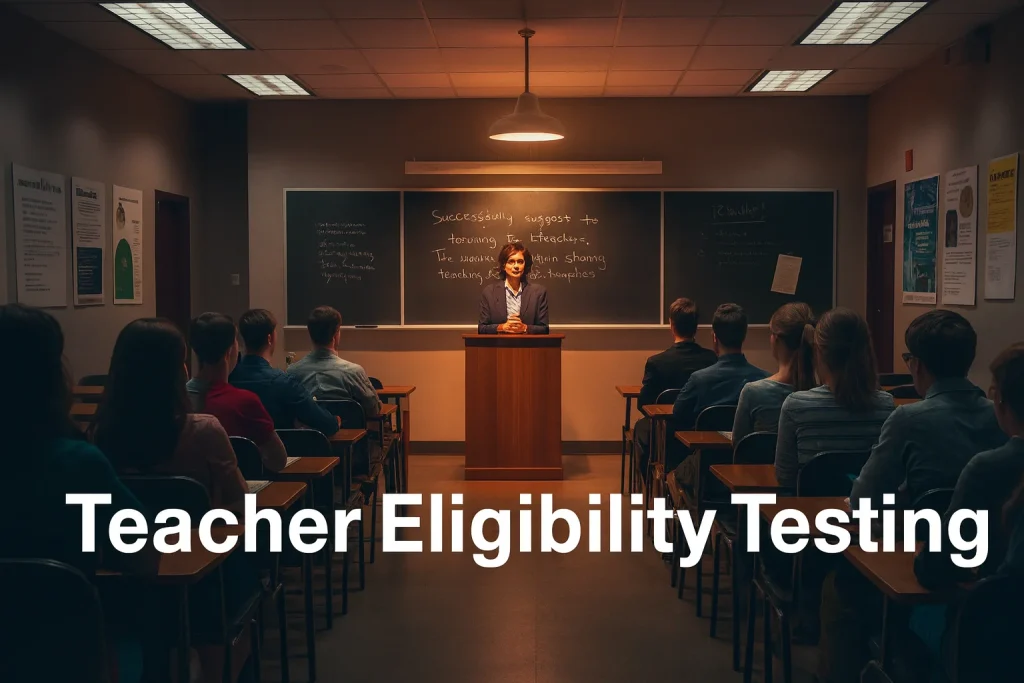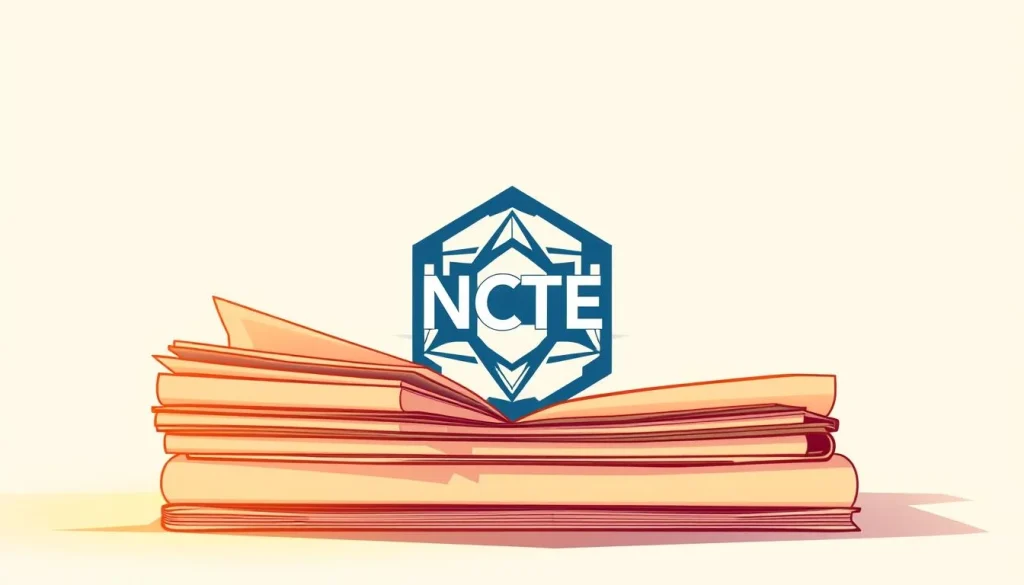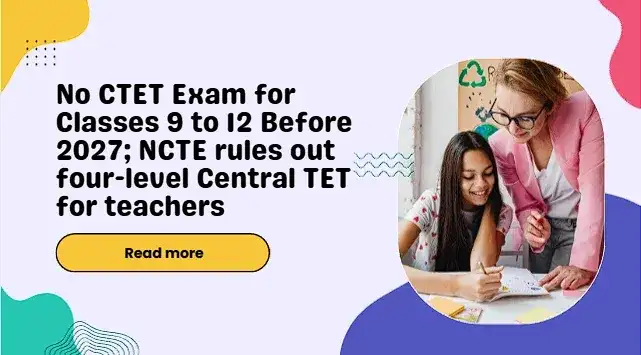CTET Exam and The National Council for Teacher Education (NCTE) has made a significant announcement regarding the Teacher Eligibility Testing process in India.
Recently, it was revealed that there will be no CTET Exam for classes 9 to 12 before 2027.This decision has implications for the teaching community, as it affects the eligibility criteria for teachers in India.
As I explore the NCTE's recent rules and their impact on the education sector, it becomes clear that the NCTE rules are aimed at streamlining the teacher recruitment process.
Key Takeaways
- The NCTE has announced that there will be no CTET Exam for classes 9 to 12 before 2027.
- The decision is part of the NCTE's efforts to reform the Teacher Eligibility Testing process.
- The new rules aim to simplify the teacher recruitment process in India.
- The NCTE's announcement has significant implications for the teaching community.
- The changes are expected to impact the eligibility criteria for teachers in India.

Current Status of Teacher Eligibility Testing in India
As part of ongoing efforts to improve education, the status of teacher eligibility testing in India is being closely examined. The Central Teacher Eligibility Test (CTET) plays a crucial role in assessing the eligibility of teachers for various classes.
Overview of the Existing CTET Framework
The existing CTET framework is designed to assess the eligibility of teachers for classes I to VIII. This framework is crucial in ensuring that teachers are qualified to teach at the elementary level.
Current Class Coverage and Limitations
Currently, the CTET covers classes I to VIII, but it does not extend to classes IX and XII. This limitation has been a subject of discussion among educationists and policymakers.
Administering Bodies and Authority
The CTET is administered by the Central Board of Secondary Education (CBSE) on behalf of the Ministry of Education. The National Council for Teacher Education (NCTE) sets the eligibility criteria and guidelines for the CTET.
Recent Announcements by NCTE Regarding Secondary Classes
The NCTE has made recent announcements regarding the eligibility testing for secondary classes.As per the latest updates, there will be no CTET exam for classes IX to XII before 2027. This decision has significant implications for the teacher eligibility testing process in India.
The NCTE's decision to postpone the CTET for secondary classes until 2027 reflects the complexities involved in implementing a comprehensive teacher eligibility testing system. It also highlights the need for a more nuanced approach to teacher assessment.
Breaking Down the NCTE's 2027 Timeline Decision
I find it crucial to break down the NCTE's decision and its implications for teacher certification. The NCTE's recent announcement regarding the CTET exam for classes 9 to 12 has significant implications for the teaching community.
Official Reasoning Behind the Postponement
The NCTE cited several reasons for postponing the CTET exam until 2027. Key factors include the need for comprehensive infrastructure development and curriculum standardization. These elements are crucial for ensuring that the examination process is robust and effective.
Implementation Challenges Cited by Authorities
Authorities have highlighted several implementation challenges that necessitated the postponement. These include:
- Infrastructure requirements for conducting the exam on a larger scale
- Curriculum standardization issues across different states and schools
Infrastructure Requirements
Developing the necessary infrastructure to support a four-level Central TET is a significant undertaking. This includes upgrading examination centers, enhancing digital resources, and training personnel. The NCTE aims to ensure that the infrastructure can handle the demands of a larger, more complex examination system.Standardizing the curriculum across classes 9 to 12 is another critical challenge. The NCTE is working to align curriculum standards with the requirements of the CTET exam, ensuring that teachers are adequately prepared and assessed.
By understanding these challenges and the NCTE's reasoning, we can better appreciate the complexities involved in reforming teacher certification in India.

The Rejected Four-Level Central TET Proposal
The National Council for Teacher Education (NCTE) had initially proposed a four-level Central Teacher Eligibility Test (TET) to standardize teacher qualifications across India. This move was part of a broader effort to enhance the quality of education by ensuring that teachers across different levels had the necessary competencies.
Original Vision for Comprehensive Teacher Testing
The original vision behind the four-level Central TET was to create a comprehensive assessment framework that would evaluate teachers' capabilities across various educational stages. This approach aimed to bring uniformity to teacher eligibility criteria, ensuring that educators were equipped to handle the demands of different class levels.
Proposed Level Structure and Class Coverage
The proposed four-level structure was designed to correspond with different educational stages. The levels were intended to cover teaching competencies for classes 1-12, with each level focusing on specific age groups and subject areas. For instance, the lower levels would assess knowledge relevant to primary classes, while higher levels would focus on more specialized subjects taught in higher classes.
Assessment Methodology
The assessment methodology for the four-level TET was to include a mix of subject knowledge, pedagogical skills, and aptitude testing. The exams were designed to be rigorous, ensuring that only qualified candidates could pass. The NCTE planned to use a combination of multiple-choice questions and descriptive tests to comprehensively evaluate a teacher's capabilities.Why the Multi-Level Approach Was Ultimately Ruled Out
Despite the comprehensive nature of the proposed four-level Central TET, the NCTE ultimately decided against its implementation. The decision was influenced by various factors, including the complexity of administering multiple levels of exams and concerns about the readiness of the education system to adopt such a comprehensive testing framework. The NCTE cited implementation challenges and the need for further consultation with stakeholders as key reasons for postponing the introduction of the four-level TET until 2027.
What This Means for Secondary Education Teachers (Classes 9-12)
The postponement of the CTET exam for classes 9 to 12 until 2027 has led to a renewed focus on existing qualification pathways for secondary education teachers. This decision by the NCTE has significant implications for how teachers in these classes are certified.
Current Qualification Pathways Remaining in Place
For now, secondary education teachers will continue to follow the existing qualification pathways. These pathways typically involve obtaining a bachelor's degree in the relevant subject and completing a teacher training program. The current certification requirements remain in effect, ensuring that teachers are qualified to teach classes 9 to 12.State-Level Certification Requirements
State-level certification requirements play a crucial role in determining the eligibility of teachers for classes 9 to 12. These requirements vary significantly across different states, leading to diverse standards in teacher certification.
Varying Standards Across Different States
Different states have their own certification criteria, which can include specific coursework-, training programs, or exams. For instance, some states may require teachers to have a master's degree in their subject area, while others may not.
Recognition and Transferability Issues
The variability in state-level certification requirements can lead to issues with the recognition and transferability of teacher certifications across state lines. Teachers moving from one state to another may need to fulfill additional certification requirements, which can be a challenge.
In conclusion, while the NCTE's decision delays the CTET exam for classes 9 to 12, the focus shifts to state-level certification and existing qualification pathways. Understanding these requirements is crucial for secondary education teachers.
CTET Exam: Development and Significance in Indian Education
As I delve into the significance of the CTET exam, it's clear that its impact on Indian education is multifaceted. The CTET exam has been instrumental in standardizing teacher eligibility across the country.
Historical Evolution
The CTET exam was introduced to ensure that teachers meet specific standards. Since its inception, it has undergone several changes to better serve its purpose.Impact on Education Quality and Teacher Standards
The CTET exam has significantly influenced education quality by setting a benchmark for teacher eligibility. This has led to improved teacher standards nationwide.

Success Metrics and Challenges
While the CTET exam has been successful in raising teacher standards, it faces challenges such as ensuring consistent implementation across states and addressing the diverse needs of various educational boards.
Teacher Feedback and Experiences
Teachers have reported that the CTET exam has helped them understand the requirements for effective teaching. However, some have expressed concerns about the exam's format and content.
The CTET exam's significance in Indian education cannot be overstated. It has not only improved teacher eligibility but also contributed to enhancing education quality.
Navigating State TETs in the Absence of Central Standards
As the NCTE delays implementing a centralized TET system for secondary classes until 2027, navigating state-specific teacher eligibility tests becomes essential. The lack of a unified national standard means that candidates must now focus on the requirements of individual states.Major Differences Between State Teacher Eligibility Tests
State TETs vary significantly in their structure, content, and difficulty level. For instance, some states may have separate exams for different subjects, while others may have a more generalized test. Understanding these differences is crucial for candidates who wish to teach in multiple states.
Recognition and Portability Challenges
The absence of a central standard leads to challenges in the recognition and portability of teacher certifications across state lines. This affects teachers who wish to move to different states for employment.
Interstate Employment Barriers
Teachers certified in one state may face difficulties finding employment in another due to differing certification requirements. This can lead to a surplus of qualified teachers in some states and a shortage in others.
Qualification Equivalency Issues
There's also the issue of qualification equivalency, where the certification from one state may not be recognized as equivalent in another. This can result in additional testing or qualification requirements for teachers looking to move.
"The lack of a unified teacher certification system complicates the process for both teachers and employers," says an education expert. "It's a barrier to mobility and can discourage talented educators from seeking opportunities across state lines."
In conclusion, navigating state TETs requires a deep understanding of the differences between state-specific tests and the challenges associated with certification portability. As the education landscape continues to evolve, addressing these challenges will be crucial.
National Education Policy 2020's Vision for Teacher Certification
The National Education Policy 2020 has laid out a comprehensive vision for teacher certification, aiming to revolutionize the Indian education system. This policy seeks to address the existing gaps in teacher qualification and certification processes.
Original NEP Roadmap for Teacher Qualifications
The original roadmap proposed by the NEP 2020 for teacher qualifications includes a multi-faceted approach to enhance teacher competencies. Key aspects of this roadmap involve:
- Integrating technology into teacher training
- Emphasizing pedagogical skills alongside subject knowledge
- Promoting continuous professional development
Revised Implementation Timeline and Adjustments
Given the complexities involved in implementing the new teacher certification framework, adjustments have been made to the original timeline. The revised implementation timeline takes into account various factors, including infrastructure readiness and resource allocation.
Short-term Accommodations
In the short term, the focus is on preparing the groundwork for the new certification process. This includes:
- Developing training modules for teachers
- Establishing assessment frameworks
Long-term Goals and Targets
The long-term goals of the NEP 2020 include achieving a significant improvement in teacher quality and educational outcomes. Targets have been set to ensure that teachers are equipped with the necessary skills and knowledge to meet the demands of a rapidly evolving educational landscape.Alternative Qualification Routes for Higher Class Teachers Until 2027
The postponement of the CTET exam for classes 9-12 until 2027 has highlighted the need for alternative teacher certification methods. As a result, educators and institutions are exploring various qualification routes to ensure that teachers are adequately prepared to teach higher classes.
State-Specific Certification Programs
Many states in India have their own certification programs for teachers, which are designed to meet specific regional needs. These state-specific certification programs often include rigorous training and assessment to ensure that teachers are equipped to handle the challenges of teaching higher classes.
Academic and Professional Qualification Pathways
Teachers can also pursue academic and professional qualification pathways to enhance their teaching credentials. This includes enrolling in university programs and obtaining relevant degrees that focus on education and pedagogy.
University Programs and Degrees
Universities across India offer various programs and degrees in education, which can significantly enhance a teacher's qualifications. These programs often cover advanced teaching methodologies and subject-specific knowledge.
Professional Development Opportunities
In addition to formal degrees, teachers can participate in professional development opportunities such as workshops, seminars, and online courses. These activities help teachers stay updated with the latest educational trends and technologies.Education Experts Weigh In on the NCTE Decision
Education experts are weighing in on the NCTE's decision to postpone the CTET exam for classes 9-12 until 2027. The move has elicited a mixed response from the education community.
Support for Delayed Implementation
Some experts support the NCTE's decision, citing the need for more time to prepare teachers and schools for the new eligibility test. They argue that rushing into implementation could lead to unintended consequences, such as a shortage of qualified teachers.
Criticism and Concerns About the Timeline
Others have expressed concerns about the delay, arguing that it could perpetuate existing inequalities in the education system. Critics point out that the postponement may allow subpar teaching practices to continue unchecked.
Quality Control Arguments
A key concern is that the delay may impact the quality of education. Experts emphasize that robust quality control measures are essential to ensure that teachers are adequately prepared.
Teacher Preparation Considerations
The NCTE must consider the implications for teacher preparation programs. Effective teacher training is crucial for the success of the CTET exam.Experts stress that the NCTE should work closely with educational institutions to develop comprehensive training programs.
Ultimately, the NCTE's decision highlights the complexities of reforming teacher eligibility criteria. Balancing the need for high-quality teachers with the practical challenges of implementation is a delicate task.
Global Perspectives on Teacher Certification Systems
As India navigates its teacher eligibility testing framework, examining global perspectives can be highly beneficial. Various countries have implemented innovative and effective teacher certification systems that can provide valuable lessons for India.
Successful Models from High-Performing Education Systems
Countries like Finland and Singapore have developed renowned education systems that prioritize teacher quality. These nations have implemented rigorous teacher certification processes that ensure high educational standards.

Finland's Approach to Teacher Qualification
Finland emphasizes the importance of teacher education, requiring all teachers to have a master's degree. This approach has contributed to Finland's high educational standards. The focus on advanced degrees ensures that teachers are well-equipped to handle complex curricula.
Singapore's Merit-Based Certification
Singapore's teacher certification process is highly competitive, with a focus on merit-based selection. This ensures that the most capable individuals are chosen for the teaching profession. The rigorous selection process involves multiple stages, including interviews and assessments.
Applicable Lessons for India's Teacher Testing Framework
By studying these global models, India can identify best practices to enhance its own teacher certification system. For instance, incorporating elements of merit-based selection and emphasizing advanced degrees could improve teacher quality.
Country | Teacher Qualification Requirement | Certification Process |
Finland | Master's degree | Rigorous education and training |
Singapore | Bachelor's degree | Merit-based selection |
India | Varies by state | CTET and state-specific exams |
Conclusion: The Future Landscape of Teacher Eligibility in India
The National Council for Teacher Education's (NCTE) decision to postpone the four-level Central Teacher Eligibility Test (CTET) Exam for classes 9-12 until 2027 marks a significant shift in the future landscape of teacher eligibility in India.
As the education sector continues to evolve, the implications of this decision will be far-reaching, impacting teacher certification and eligibility criteria. The current framework for teacher eligibility will remain in place, with state-level certification requirements playing a crucial role in determining teacher qualifications.
Looking ahead, the NCTE's decision highlights the need for a more nuanced approach to teacher eligibility, one that balances the need for standardized testing with the complexities of state-level certification requirements. As India continues to develop its education system, the future landscape of teacher eligibility will be shaped by ongoing debates around teacher certification and the role of the CTET Exam.








Comments(0)